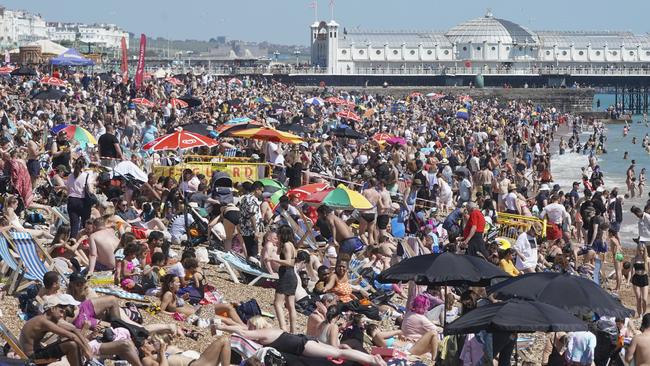Jabs giving false sense of safety as the Indian variant increases
Vaccination success is giving Britons a ‘false sense of security’ in the battle against the Indian variant, a leading scientist has said.

Vaccination success is giving Britons a “false sense of security” in the battle against the Indian variant, a leading scientist has said as the government insists that it expected cases to rise.
Professor Ravi Gupta, of Cambridge University, who is a member of the government’s New and Emerging Respiratory Virus Threats Advisory Group (Nervtag), urged Boris Johnson to delay the June 21 reopening by a matter of weeks amid growing fears about Covid-19 numbers.
“There’s been exponential growth in the number of new cases and at least three quarters of them are the new variant,” Professor Gupta told the BBC.
“Of course the numbers of cases are still relatively low at the moment but all waves start with low numbers of cases, and that rumble in the background, and then become explosive.
“So the key here is what we’re seeing is the signs of an early wave. It will probably take longer than previous waves to emerge because of the fact that we do have quite high levels of vaccination in the population, so there may be a false sense of security for some time – and that’s our concern.”
On Monday (Tuesday AEST) 3383 new Covid cases were reported in the UK, making a total of 23,418 over the past week – an increase of 28.8 per cent over the previous week. There was one new death within 28 days of a positive test, with the weekly tally of 58 up 45 per cent on the previous week. There were 133 hospital admissions, and the weekly figure of 870 represented a 23.2 per cent increase.
Professor Gupta said that the increases, driven by the more transmissible Indian variant, necessitated a short delay to allow the vaccines to catch up.
“We’re not too far from reaching the levels of vaccination that would help us contain the virus,” he said. “I think that people are not saying we should abandon the June 21 date altogether, but just to delay it by a few weeks while we gather more intelligence and we can look at the trajectory in a clearer way.”
But George Eustice, the Environment Secretary, said that it was too soon for the government to make a decision about June 21. He suggested that some of the rises in case numbers were because of the most recent phase of the reopening a fortnight ago, when restaurants and pubs were allowed to serve people indoors in England again.
“The rates are going up again, slightly, but from a low base – and that’s probably to be expected given that there’s still a significant number of younger people that are now out and mixing and haven’t had the vaccine,” Mr Eustice said. “But I think the right thing to do is in a couple of weeks’ time assess that data before deciding what we can do.”
Mr Johnson is expected to announce whether he is proceeding with June 21 just a week before on June 14. Some in Whitehall believe that he might press ahead with aspects of stage four, such as abolishing social distancing, while continuing with others, such as the advice that people work from home where possible.
Professor Robert Read of Southampton University, who sits on the Joint Committee on Vaccination and Immunisation (JCVI), said he did “not particularly” agree with Professor Gupta. “You have to remember that if you’ve got all of your over-50-year-olds vaccinated, the likelihood that there would be a catastrophic effect on health and in particular on the NHS in this country is pretty small,” he said.
“Unless, of course, there’s complete vaccine escape, which is extremely unlikely. So it’s a dynamic situation … we’ve got a lot of our adults now vaccinated and that program is going very quickly.”
Professor Susan Michie, a professor of health psychology at University College London who sits on the Scientific Pandemic Insights Group on Behaviours (SPI-B), a government advisory group, told Sky News: “We’re on a knife edge. We could go either way with this new variant.
“Either it could run away as it did before Christmas, which would be extremely serious and we’d have to have more restrictions, or potentially it could be contained. But that does mean everybody needs to be cautious right now. Everybody’s behaviour could potentially make the difference. So the key thing at the moment is for people to do their socialising outdoors, and if people are inside, make sure windows and doors are open.”
The Times



To join the conversation, please log in. Don't have an account? Register
Join the conversation, you are commenting as Logout